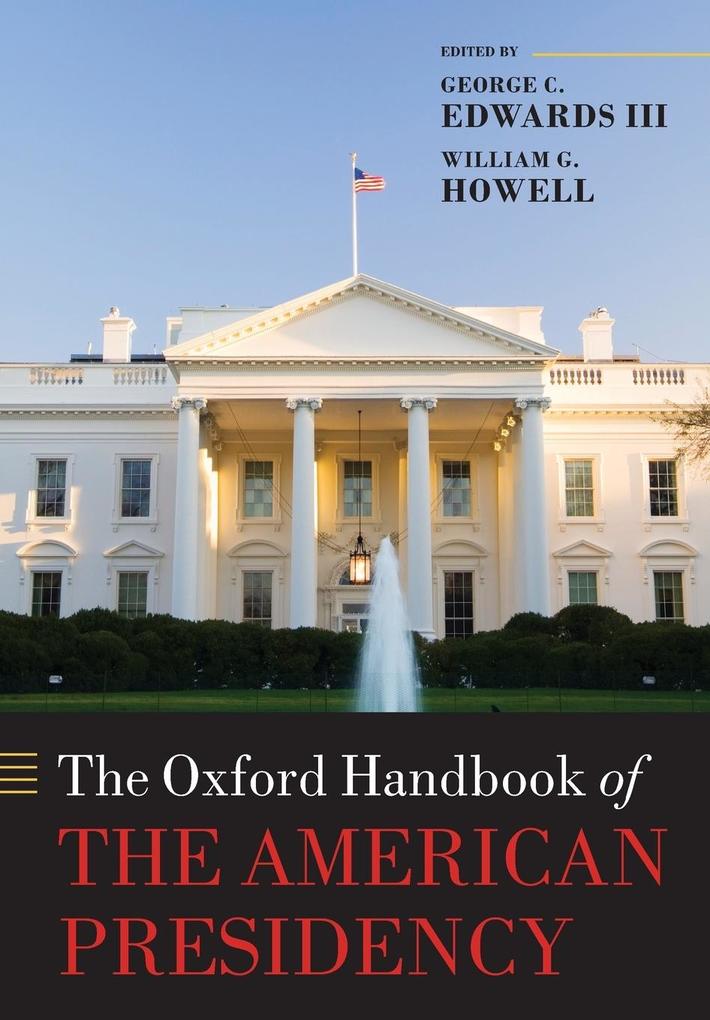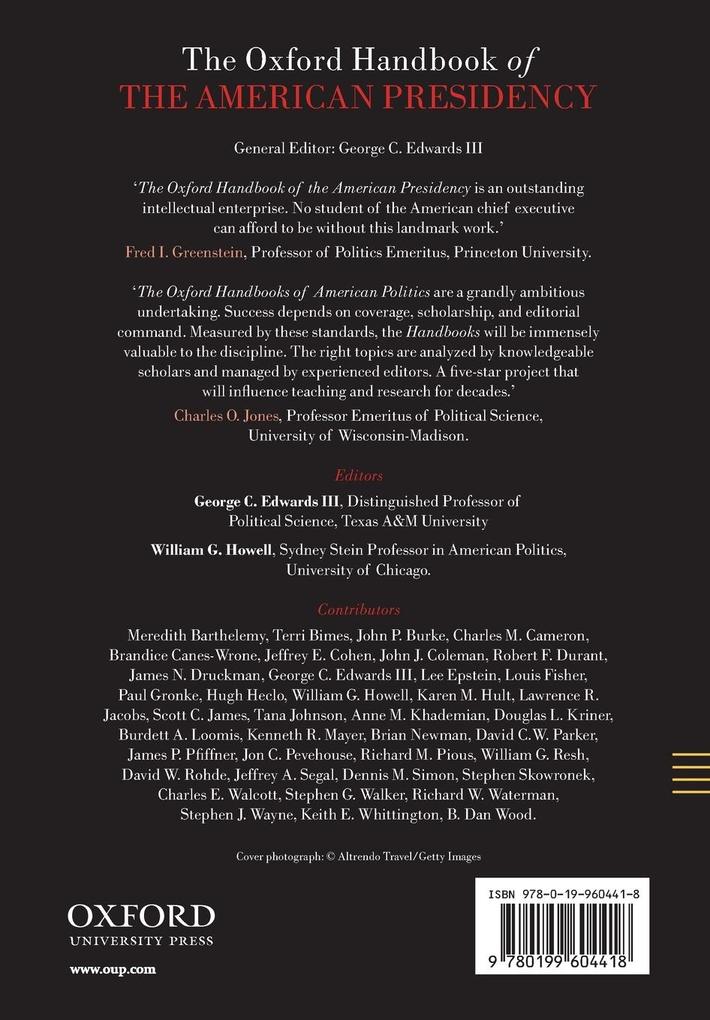As the central feature on the American political landscape, it is only natural that scholars and commentators focus on the presidency. So much is written about the subject, in fact, that it is often difficult to know where we stand in our understanding of it. The Oxford Handbook of the American Presidency will help scholars assess the state of scholarship on the presidency and the directions in which it needs to move. Never before has the academic literature on the American presidency received such an extended treatment. Nearly three dozen chapters critically assess both the major contributions to a literature on a dimension of the presidency and the ways in which the literature has developed. The authors of each chapter seek to identify weaknesses in the existing literature- be they logical flaws, methodological errors, oversights, or some combination therein-and to offer their views about especially productive lines of future inquiry. Equally important, the authors also identify areas of research that are unlikely to bear additional fruits. These chapters offer a distinctive point of view, an argument about the successes and failures of past scholarship, and a set of recommendations about how future work ought to develop. Thus, this volume will help set the agenda for research on the presidency for the next decade.
The Oxford Handbooks of American Politics are a set of reference books offering authoritative and engaging critical overviews of the state of scholarship on American politics. Each volume focuses on a particular aspect of the field. The project is under the General Editorship of George C. Edwards III, and distinguished specialists in their respective fields edit each volume. The Handbooks aim not just to report on the discipline, but also to shape it as scholars critically assess the scholarship on a topic and propose directions in which it needs to move. The series is an indispensable reference for anyone working in American politics.
General Editor for The Oxford Handbooks of American Politics: George C. Edwards III.
Inhaltsverzeichnis
- 1: George C. Edwards III and William G. Howell: Introduction
- Approaches to Studying the Presidency
- 2: William G. Howell: Quantitative Approaches to the Study of the Presidency
- 3: Brandice Canes-Wrone: Game Theory and the Study of the American Presidency
- 4: Scott C. James: Historical Institutionalism, Political Development, and the Presidency
- Precursors to Governance
- 5: James P. Pfiffner: Presidential Transitions
- 6: B. Dan Wood: Presidents and the Political Agenda
- The Public Presidency
- 7: Dennis M. Simon: Public Expectations of the President
- 8: James N. Druckman and Lawrence R. Jacobs: Presidential Responsiveness to Public Opinion
- 9: George C. Edwards III: Leading the Public
- 10: Terri Bimes: Understanding the Rhetorical Presidency
- 11: Paul Gronke and Brian Newman: Public Evaluations of Presidents
- 12: Jeffrey E. Cohen: The Presidency and the Mass Media
- The Legislative Presidency
- 13: David W. Rhode and Meredith Barthelemy: The President and Congressional Parties in an Era of Polarization
- 14: Stephen J. Wayne: Legislative Skills
- 15: George C. Edwards III: Presidential Approval as a Source of Influence in Congress
- 16: John J. Coleman and David C. W. Parker: The Consequences of Divided Government
- 17: Burdett A. Loomis: Connecting Interest Groups to the Presidency
- Unilateral Action
- 18: Kenneth R. Mayer: Going Alone: The Presidential Power of Unilateral Action
- 19: Richard M. Pious: Prerogative Power and Presidential Politics
- 20: Richard W. Waterman: Assessing the Unilateral Presidency
- Decision-Making
- 21: John P. Burke: Organizational Structure and Presidential Decision-Making
- 22: Karen M. Hult and Charles E. Walcott: Influences on Presidential Decision-Making
- 23: Stephen G. Walker: The Psychology of Presidential Decision-Making
- Implementing Policy
- 24: Robert F. Durant and William G. Resh: Presidential Agendas, Administrative Strategies, and the Bureaucracy
- 25: Anne M. Khademian: The Presidency-Bureaucracy Nexus: Examining Competence and Responsiveness
- Judicial Relations
- 26: Lee Epstein and Jeffrey A. Segal: Nominating Federal Judges and Justices
- 27: Keith E. Whittington: Judicial Checks on the President
- International Politics
- 28: Douglas L. Kriner: Presidents, Domestic Politics, and the International Arena
- 29: Jon C. Pevehouse: Presidents and International Cooperation
- 30: William G. Howell and Tana Johnson: War's Contributions to Presidential Power
- Reflections
- 31: Stephen Skowronek: The Paradigm of Development in Presidential History
- 32: Hugh Heclo: Whose Presidency Is This Anyhow?
- 33: Louis Fisher: Political Scientists and the Public Law Tradition
- 34: George C. Edwards III: The Study of Leadership



































